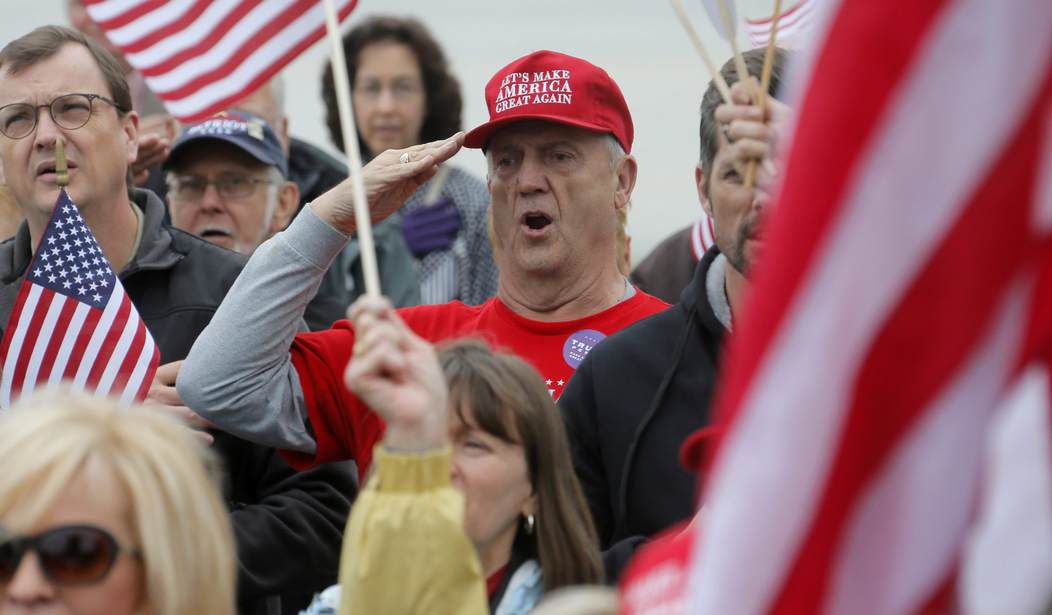On Friday Deputy Attorney General Rod Rosenstein announced indictments against 13 Russian nationals and three Russian entities on charges they conspired against the United States with the objective of “impairing, obstructing, and defeating the lawful governmental functions of the United States.” One of the revelations contained within the indictment is that Russian operatives allegedly posed as Americans on social media to organize events for then-candidates Donald Trump and Hillary Clinton, beginning as early as 2014—and that Americans both attended and helped to organize the rallies. According to the indictment, Russian operatives hoped to “interfere with U.S. political and electoral processes, including the 2016 U.S. presidential election.”
“In or around June and July 2016, Defendants and their co-conspirators used the Facebook group ‘Being Patriotic,’ the Twitter account @March_for_Trump, and other organization accounts to organize two political rallies in New York,” the indictment alleges. “The first rally was called ‘March for Trump’ and held on June 25, 2016. The second rally was called ‘Down with Hillary’ and held on July 23, 2016.” They also conspired to plan rallies to support Hillary Clinton, including one in July 2016 called “Support Hillary. Save American Muslims.” The majority of the rallies were in support of Trump, though several of them favored Clinton or “The Resistance.”
In late 2016 the co-conspirators allegedly used their Facebook and Twitter personas to organize a series of coordinated rallies in Florida. The rallies were referred to as “Florida Goes Trump” and were held on August 20, 2016.
The ruse was incredibly detailed and well planned. The defendants used the fake personas to “communicate with Trump Campaign staff involved in local community outreach about the ‘Florida Goes Trump’ rallies.” There’s no indication Trump’s campaign staff knew they were communicating with the Russians. The individuals and groups also purchased ads on Facebook and Instagram to promote the rallies and contacted multiple grassroots groups that were at the time supporting Trump in an unofficial capacity. Many of the groups contacted agreed to serve as local coordinators for the rallies.
The Russian operatives also reached out to individuals in the U.S., inviting them to participate in rallies and asking many of them to help with the effort. “For example, Defendants and their co-conspirators asked one U.S. person to build a cage on a flatbed truck and another U.S. person to wear a costume portraying Clinton in a prison uniform,” according to the indictment. “Defendants and their co-conspirators paid these individuals to complete the requests.”
In August of 2016 the Russian operatives stole the identity of a U.S. person (identified only as “T.W.”) and sent emails to Florida grassroots groups that read, in part:
My name is [T.W.] and I represent a conservative patriot community named as “Being Patriotic.” . . . So we’re gonna organize a flash mob across Florida to support Mr. Trump. We clearly understand that the elections winner will be predestined by purple states. And we must win Florida. . . . We got a lot of volunteers in ~25 locations and it’s just the beginning. We’re currently choosing venues for each location and recruiting more activists. This is why we ask you to spread this info and participate in the flash mob.
In September 2016, the operatives organized a rally in Pennsylvania called “Miners for Trump,” scheduled for October 2, 2016. The indictment highlights several other examples of Russia-organized rallies in the months leading up to the election.
After the 2016 election, the Russians coordinated to organize rallies in in New York and North Carolina — some supporting the president and others protesting the results of the 2016 election.
“Defendants and their co-conspirators organized a rally in New York through one organization-controlled group designed to ‘show your support for President-Elect Donald Trump’ held on or about November 12, 2016,” the indictment claims. “At the same time, Defendants and their co-conspirators, through another organization-controlled group, organized a rally in New York called ‘Trump is NOT my President’ held on or about November 12, 2016. Similarly, Defendants and their co-conspirators organized a rally entitled ‘Charlotte Against Trump’ in Charlotte, North Carolina, held on or about November 19, 2016.”
The indictment doesn’t indicate how many Americans were lured to these rallies that were allegedly illegally organized by Russian operatives.
“U.S. law bans foreign nationals from making certain expenditures or financial disbursements for the purpose of influencing federal elections,” according to the indictment. “U.S. law also bars agents of any foreign entity from engaging in political activities within the United States without first registering with the Attorney General. And U.S. law requires certain foreign nationals seeking entry to the United States to obtain a visa by providing truthful and accurate information to the government.”
Read the whole indictment below:
Internet Research Agency Indictment by PJ Media on Scribd










Join the conversation as a VIP Member